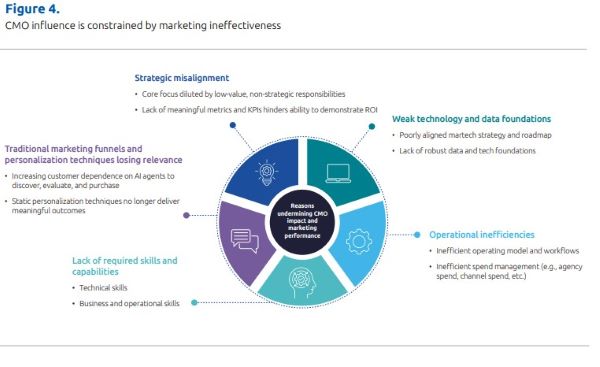 CMO influence is constrained by marketing ineffectiveness;
Credit: Capgemini Research Institute analysis
CMO influence is constrained by marketing ineffectiveness;
Credit: Capgemini Research Institute analysis
On Wednesday 19 November 2025, Capgemini, a technology transformation company with an office in Bertrange, released a new report from its research institute stating that nearly 70% of marketing leaders agree agentic artificial intelligence (AI) will be transformative, yet effectiveness remains “elusive”.
The Capgemini Research Institute’s Chief Marketing Officer (CMO) Playbook, “From complexity to clarity: How CMOs can reclaim marketing to build competitive edge”, found that despite high expectations for generative and agentic artificial intelligence (AI), the role of the Chief Marketing Officer (CMO) is at a crossroads.
The report highlights the need to redesign operating models, integrate AI, strengthen CMO-CIO collaboration and invest in AI skills to better align technology and data with strategic priorities.
CMOs are facing multiple challenges such as tightening budgets, declining strategic influence, limited ownership of marketing technology (martech) budgets and the integration of AI. More than 55% of marketing leaders say these initiatives are currently funded by Information Technology (IT), with limited marketing control.
The report found that marketing budgets have tightened over the past two years to an average of 5% of company revenue, while CMO involvement in critical decision-making has dropped from 70% to 55% over the same period. However, only 15% of marketing leaders stated that low-value tasks are automated in their function, with most teams remaining focused on manual work, limiting their time for brand building, innovation and customer connection.
The research also found that current martech and data strategies do not use real-time data effectively. Only 18% of marketing leaders strongly believe they are successfully personalising customer interactions using AI / generative artificial intelligence (Gen AI) to boost engagement and outcomes, highlighting the need for stronger collaboration between the teams of the Chief Information Officer (CIO) and CMO. It adds that capability gaps persist, with 68% of marketing leaders saying their teams need to upskill in AI, ethics and business strategy to remain competitive.
Moreover, the report shows that nearly seven in ten large organisations now use Gen AI in marketing. Its share of martech investment has risen from 64% in 2023 to 79% in 2025. Yet only 7% of marketers strongly agree that AI has boosted marketing effectiveness.
While optimism for agentic AI is high, with nearly 70% agreeing that autonomous or multi-agent AI could support various marketing uses, only few organisations are testing or using it today. The report cites a lack of the right skills, data privacy challenges, security risks, ethical concerns and low trust in autonomous AI-generated decisions as barriers to fully leveraging AI’s potential.
Integrating sales and go-to-market strategies is a priority for 61% of marketers, yet fewer than 25% have shared key performance indicators (KPIs), leading to fragmented execution.
“CMOs today are expected to drive growth and meet sales targets, while also being experts in data and AI - they must now market to both humans and agents. But many lack the resources, control or clarity to manage these growing demands. AI tools offer great potential but often fail to deliver results as budgets, strategy and technology aren’t fully aligned,” said Gagandeep Gadri, Managing Director at frog, part of Capgemini. “This is a pivotal moment for marketers to rethink their function’s purpose and reposition it not just as a support department but as a driver of customer experience and enterprise growth to create real business value,” he stated.
The Capgemini Research Institute conducted the survey in July 2025, engaging 1,500 director-level executives overseeing marketing strategies across fifteen countries, all from organisations with annual revenues above $1 billion.
EO








